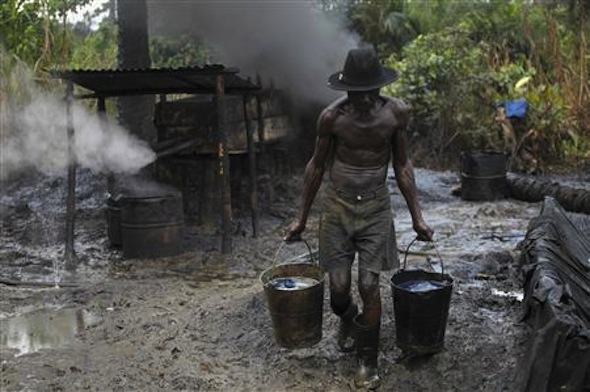
Ebiowei, 48, carries refined oil in buckets at an illegal oil refinery site. Credit: REUTERS/Akintunde Akinleye
Nigeria is experiencing difficulties selling its crude oil, but imports most of its refined oil products. No, that is not a mistake.
Nigeria Bearing Brunt of U.S. Shale Oil Boom is the title of a recent Wall Street Journal article. As the title suggests, increased domestic production in the U.S. has had a serious impact on Nigerian oil sales:
Exports of Nigerian oil to the U.S. almost halved between 2011 and 2012, according to (U.S. Energy Information Administration) data. In the late 2000s, Nigeria regularly shipped around one million barrels a day of crude to the U.S., but last year that number was just 405,000 barrels a day.
Other members of OPEC have also been affected. Exports from both Angola and Algeria fell more than 30% last year. But the impact has been the most severe in Nigeria, which has historically sent the bulk of its oil exports to the U.S., and the country has been forced to react.
“Nigeria is repositioning its exports in the light of this emergent threat,” and has so far been able to find alternative markets for its crude, said Andrew Yakubu, group managing director of Nigeria’s state oil company, Nigerian National Petroleum Corp.
But traders and analysts say Nigeria has experienced difficulty finding a home for its crude, and it has had to cut prices.
A few weeks before the Wall Street Journal article appeared, The Atlantic featured an incredible photo essay on illegal oil refining by Reuters photojournalist, Akintunde Akinleye. Akinleye, who gained access to an illegal oil refinery near the river Nun in Nigeria’s oil state of Bayelsa, described the dirty and dangerous work in a Reuters article:
Forty-year-old Goodluck, who shares his name and tribe with the president, says he would much rather have got a respectable job, except that, despite the billions of petrodollars coursing through the region’s creeks over decades, there aren’t any.
“This refinery is the only thing I know that can ensure my survival, at least for now,” he told Reuters, sitting under a small makeshift iron roof shelter from the boiling sun, his hands sticky with crude.
“Doing this you can make up to $60 in a day,” he said, gesturing with a nod towards oil drums full of homemade diesel shaded by smoked-blackened palm trees….
There is plenty of demand for the diesel, kerosene and gasoline Goodluck makes by boiling up stolen crude in a steel drum over a wood fire.
Nigeria’s legal refineries have been left largely defunct by decades of mismanagement and corruption, with the result that fuel stations in the world’s 12th largest oil producing country often run out of supplies.
Oil companies in Nigeria should be refining Nigerian oil for the domestic and regional markets. The oil and the demand are both there. But things aren’t so simple. Read more about the “dismal state of Nigeria’s four government-owned refineries” and those who benefit from it — including oil importers — in a November 2012 editorial in the Nigerian paper, Punch.
